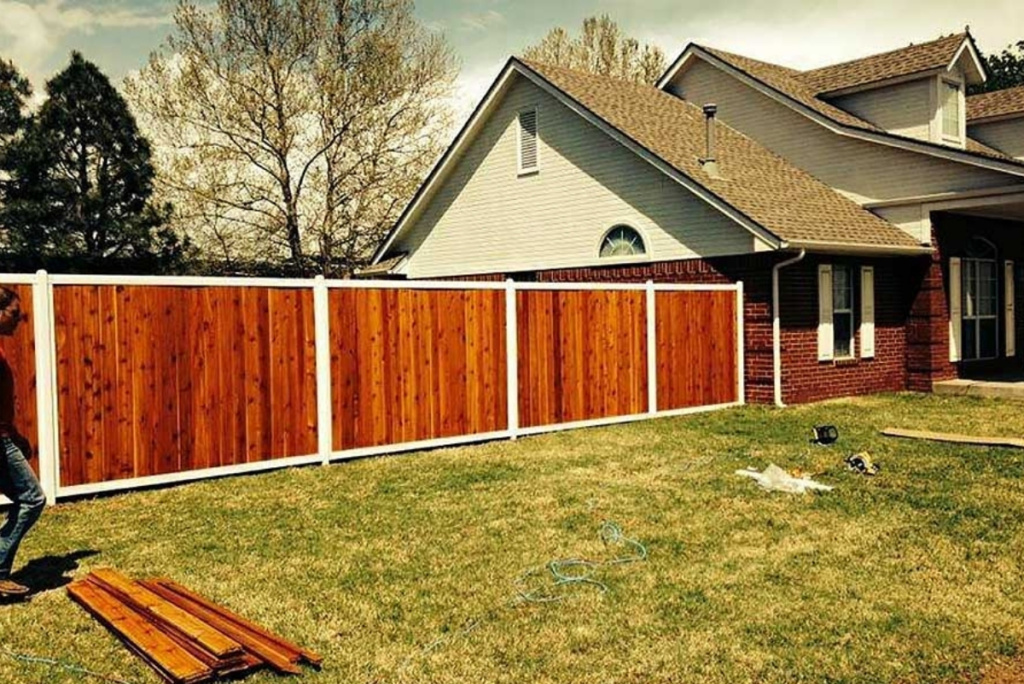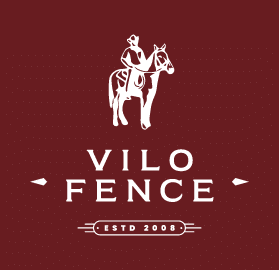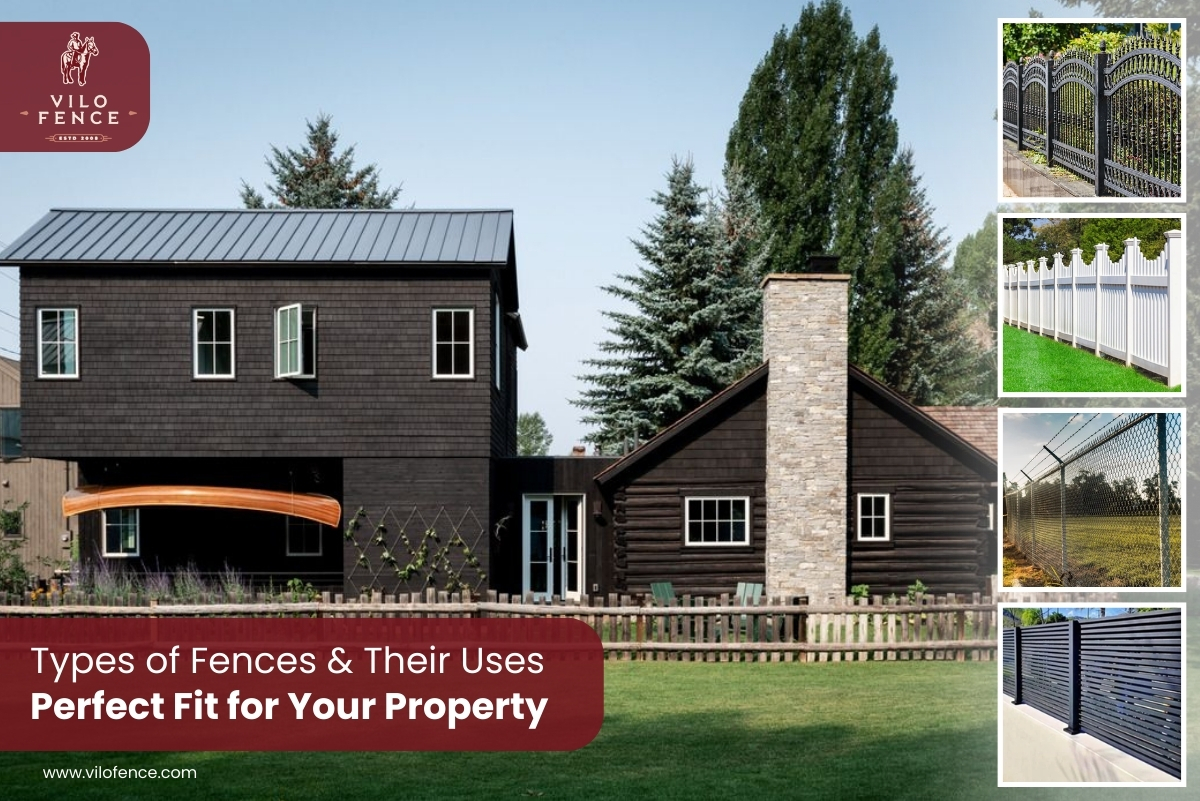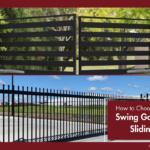Looking for ways to enhance your property’s security, privacy, or curb appeal? A well-chosen fence can do all that and more! With a variety of fencing options available—from traditional wooden fences to vinyl fences—finding the right fit for your home or business can be overwhelming. This guide will help you understand the different types of fences, their uses, and how to pick the perfect one for your needs.
Explore the Different Types of Fences and Their Uses
1. Wooden Fence
Wooden fences are among the most popular and classic fencing options. They offer a timeless look that blends well with various landscapes and architectural styles. These fences come in different styles, including picket, split rail, and privacy fences.
Uses & Benefits
- Privacy & Security – Tall wooden fences provide excellent privacy and can keep intruders out.
- Aesthetic Appeal – Wood fences enhance curb appeal and can be customized with paint or stain.
- Versatility – Suitable for residential properties, gardens, farms, and commercial spaces.
- Eco-Friendly – Made from natural materials, making them environmentally friendly when sourced sustainably.
Maintenance & Lifespan
Wood fences require regular maintenance, including staining or painting to protect against moisture and pests. With proper care, they can last between 15 to 20 years.
2. Steel Fence
Steel fences are renowned for being strong and long-lasting. They provide a high level of security and are often used in both residential and commercial settings.
Uses & Benefits
- High Security – Steel fences are robust and resistant to impact, making them ideal for security purposes.
- Longevity – They can last decades without significant wear and tear.
- Weather Resistance – Modern steel fences are coated with protective layers to prevent rust and corrosion.
- Low Maintenance – Steel fences require minimal maintenance compared to wooden fences.
Maintenance & Lifespan
Steel fences are relatively low maintenance but may need occasional painting or anti-rust coatings. They can last over 50 years when properly maintained.
3. Vinyl (PVC) Fence
PVC vinyl fences are an excellent alternative to traditional wood fences. They are made from polyvinyl chloride (PVC), offering a long-lasting and maintenance-free fencing solution.
Uses & Benefits
- Durability: Able to endure pests, weather, and moisture.
- Minimal Maintenance – Unlike wood, vinyl fences do not require staining or painting.
- Versatility – Available in various styles, including privacy, picket, and ranch rail fences.
- Eco-Friendly – Recyclable and does not require harmful chemical treatments.
Maintenance & Lifespan
Vinyl fence Tampa requires little maintenance beyond occasional cleaning with soap and water. They typically last 30-40 years.
4. Chain Link Fence
Chain link fences are one of the most practical and cost-effective fencing solutions. They are commonly used for security and containment purposes.
Uses & Benefits
- Affordability – Chain link fences are the most budget-friendly fencing option.
- Security – Provides a sturdy barrier while maintaining visibility.
- Quick Installation – Easier and faster to install compared to other fence types.
- Versatility – Suitable for residential yards, sports fields, schools, and commercial areas.
Maintenance & Lifespan
Chain link fences require minimal maintenance and can last over 20 years with galvanized or coated finishes.
5. Aluminum Fence
Aluminum fences provide a decorative yet durable option for fencing. They offer an elegant look similar to wrought iron but without the maintenance hassles.
Uses & Benefits
- Rust-Resistant – Aluminum fences do not corrode or wear.
- Aesthetic Appeal – Offers a sophisticated look while maintaining security.
- Lightweight & Easy to Install – Can be installed without the need for heavy-duty tools.
- Environmentally Friendly – Made from recyclable materials.
Maintenance & Lifespan
Aluminum fences require very little maintenance, often only needing occasional cleaning. They can last over 50 years.
By understanding the different fencing options and choosing aluminum fence installers, you can make an informed decision that meets your specific needs. Happy fencing!
How to Choose the Right Fence for Your Property

When selecting a fence, consider the following essential tips:
- Purpose – Are you looking for privacy, security, aesthetics, or property boundaries?
- Budget – Determine how much you are willing to invest in fences.
- Maintenance – Choose a fence that fits your maintenance preferences.
- Durability & Climate – Some fences perform better in certain weather conditions than others.
- Property Type – Residential, commercial, or agricultural needs may require different fence types.
If you need expert advice or hire a fencing company for installation for your fencing needs, contact Vilo Fence in Tampa today! Our team can help you choose the best fence for your property, ensuring quality and durability for years to come.
Final Thoughts
In the end, choosing the right fence enhances your property’s value, security, and appearance. Whether you prefer the classic appeal of wood, the durability of steel, the low-maintenance benefits of vinyl, the affordability of chain link, or the elegance of aluminum, there is a fencing option that perfectly fits your needs.
FAQs
Q1. Which type of fence is best for privacy?
Ans. Wooden and vinyl fences are the best choices for privacy as they provide solid barriers that block visibility.
Q2. What is the most cost-effective fencing option?
Ans. Chain link fences are the most budget-friendly option, offering durability and security at a low cost. Consider choosing fence contractors in Orlando FL for smooth and accurate installation.
Q3. How long does a fence typically last?
Ans. Lifespans vary by material—wood (15-20 years), steel (50+ years), vinyl (30-40 years), chain link (20+ years), and aluminum (50+ years). Proper maintenance can extend a fence’s lifespan significantly.






